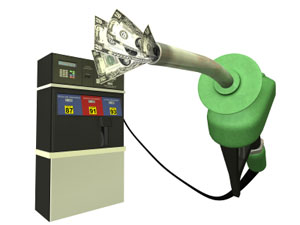
We all hate the HST, right? It's now a populist campaign, led by former premier Bill Vander Zalm, who has, by the way, also predicted the HST will expand to take in the U.S. and Mexico and eventually be controlled from Brussels, Belgium, as part of a conspiratorial New World Order.
The HST has its pros and cons, but maybe we're being blinded by it and missing the real target. To explain why, let me step back for a moment. Under the PST, various "good" things are exempt, including bicycles and renewable energy equipment. That makes sense. But so are transport fuels and residential heating fuels: oil and gas.
Under the HST, the only exemptions allowed are those on a federal Department of Finance list in Ottawa that does not include bicycles or renewable energy equipment. So these exemptions have to go, along with almost everything else. The exemptions on transport and residential fuels, however, are permitted, and will remain.
So, this summer when virtually everything we buy in B.C. carries the full 12 per cent HST, fossil fuels for transport and residential heating will be exempt. They will receive a seven per cent tax break -- twice the level of the 3.5 per cent carbon tax.
Instead, fund a green revolution
One might ask the MLAs in the Legislature why it's so important to subsidize fossil fuels, above all else. Is it not a glaring contradiction to the aim of reducing air pollution, traffic congestion and greenhouse has emissions, and making B.C. a clean energy leader? Even if the petition to stop the HST succeeds, the seven per cent fossil fuels subsidy will remain in the PST.
The BC Sustainable Energy Association has pondered the contradiction and prepared a solution. We propose eliminating the seven per cent subsidy to fossil fuels, increasing the price of fuel for transport and residential heating by seven per cent, and using the income to create two new funds: one for Healthy Transportation worth $300 million a year, and one for Healthy Housing worth $200 million a year.
To counter the loss of the seven per cent subsidy, the funds would be used for programs that would enable people to reduce their travel and heating costs by up to 20 per cent.
From the Healthy Transportation Fund, we could invest $65 million a year on new cycling infrastructure -- that's 20 times more than the $3 million promised for cycling in the 2010-2011 budget.
We could invest a $135 million a year in transit, allowing local communities to use the funds for increased services, reduced fares, improved shelters or electronic timetables, as they saw fit. This would be in addition to the $173 million that was promised for transit in same budget.
We could also invest in pedestrian improvements, ride sharing, car sharing, video-conferencing, electric cars and eco-driving education. With every initiative, we could reduce air pollution, greenhouse gas emissions and traffic congestion, and enable people to save money on their travel costs.
Pay for healthy housing, too
From the Healthy Housing Fund, we could invest $100 million a year in an expanded LiveSmart program, helping people make their homes more energy efficient. This would be in addition to the $35 million the government recently committed to restore LiveSmart over three years, enabling an eight-fold expansion of the program. This would create a lot of new skilled trades jobs, as well as reducing people's home energy bills.
We could also create an Energy Efficiency Loan Fund with zero or very low interest loans, and targetted programs for rental properties, First Nations, and solar hot water.
Yes, it's a green tax revolt -- a tax revolt in reverse. We're saying, "Let's eliminate the subsidy, and use the income in positive ways that everyone can benefit from." That includes pick-up drivers in the rural Cariboo, where cycling and transit may not be an option. By making ride sharing really easy, they could pick up the phone and cut their travel costs in half.
For this to succeed, all three major political parties must embrace the idea so that it does not become a political football. Can that be achieved? It might take a miracle, but it's also good common sense. Why subsidize the bad things? That certainly makes no sense. ![]()
Read more: Environment















Tyee Commenting Guidelines
Comments that violate guidelines risk being deleted, and violations may result in a temporary or permanent user ban. Maintain the spirit of good conversation to stay in the discussion.
*Please note The Tyee is not a forum for spreading misinformation about COVID-19, denying its existence or minimizing its risk to public health.
Do:
Do not: